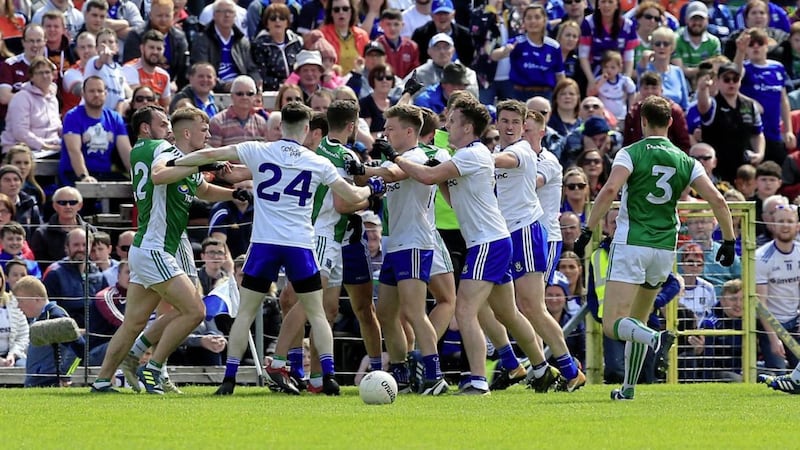WITH the Wimbledon tennis tournament imminent, that got me thinking about seedings in the GAA.
That's been mooted before in relation to 'Champions League style groups' consisting of four counties each.
However, such a system would still probably lead to big beatings and 'dead rubbers'.
Seeds could still take root in the football qualifiers, though. The competitiveness of the Ulster and Connacht championships may well preserve them in any new format.
What happens after the provincial contests conclude is what's really up for discussion.
Ideally there'd be a system which rewarded merit and also gave teams a realistic opportunity to make some progress.
There'd be no point in pitting seed 1 against 32, Dublin versus London (that would be as one-sided as it has been in the Brexit negotiations).
Even having 1 against 25, Dublin versus Derry, would only result in a comfortable win for the All-Ireland champs, although if 8 came up against 17, Cavan v Westmeath, that surely would be much closer.
Seeding in the qualifiers would surely be fairer than the current format.
Seeds could be decided on League placings (as above) or some form of Gaelic rankings, akin to the FIFA rankings in soccer.
Ideally any rankings should be based on a combination of performances in both League and Championship, although not too much extra weighting should be given to the latter given how unfair the original provincial starting points are.
At present, the system favours counties from Connacht and Munster and works against those from Leinster and Ulster which are knocked out early on.
For several years we had the hard-to-fathom A and B paths through the qualifiers, which never seemed close to being balanced, as was the way with the A and B sides of the National Football League before that format ended more than a decade ago.
Accuse me of bias to the south-east (of Ulster), but Armagh, Down, and Monaghan have suffered so far in this year's qualifier draws, while Derry have benefitted.
Had the teams in round one been split into two groups of eight based on League placings, those would have been as follows (in order of highest league finish):
Monaghan, Fermanagh, Tipperary, Westmeath, Down, Louth, Longford, and Offaly; then Carlow, Derry, Leitrim, Antrim, Waterford, Wexford, Wicklow, and London.
Those seedings would have made for some different pairings: Monaghan couldn't have met Fermanagh, while Tipperary couldn't have been paired with Down, and Derry would have had to meet a team theoretically tougher than Wexford. The luck of the lack of seedings also went with Leitrim, who got to host Wicklow, and also (like Derry) progressed to round two.
As it turned out, only two counties defeated sides which finished higher than them in the League – both from Ulster, natch: Antrim and Down. Credit to the Saffrons for winning away to Louth, while Down made the most of being handed home advantage and edged out Tipp, who had been relegated earlier this year anyway.
Victors should carry forward the ranking of the vanquished, at any stage of the Championship(s).
Looking ahead to round two of the qualifiers, Limerick also beat Tipp before losing out to Cork, therefore the Treatymen become '16' (obviously the system would have to define which conqueror of Tipp ranked higher, Limerick or Down). Laois also beat Westmeath to marginally improve their rating to 17.
The results of the provincial championships offer some reward for status, with only Laois and Limerick beating teams that had finished higher than them in the League (and Laois had finished level on points with Westmeath in Division Three, behind them only by the minimum margin on scoring difference).
So there's already been some application of status, but Monaghan and Down should be in the theoretical higher pot for round two with Laois and Sligo demoted to the lower section.
Instead, as noted above, the skewed numbers in the various provincial championships can help out counties from Connacht and Munster and often operate to the disadvantage of teams from Leinster and Ulster.
Even had the Down not boosted their ranking by beating Tipp, they still rank higher than Sligo from the League, so should be elevated to the top pot. That would obviously have meant Paddy Tally's side not having to take on Mayo. The westerners would arguably be top seeds, having won the Division One Final, although any sane person would still rank Dublin as the best.
Again, Monaghan have been hard done-by, paired with Armagh, although at least the Farneymen do have home advantage once more at Clones.
It's hard to argue that Laois have enjoyed much luck from being in the higher 'pot', but it's undoubtedly another boost for Derry to be up against one of the weakest teams dropping into round two after defeat in a provincial semi-final.
After this weekend's round of matches have been completed, at least two fairly high-ranking Ulster counties will have been knocked out by another team from the northern province: Fermanagh and Armagh/ Monaghan.
In contrast, Offaly might reach round three having been handed home qualifier draws against the counties which finished bottom of Divisions Three and Four (Sligo and London) – although the Faithful county probably needs all the luck it can get at the moment.
The football qualifiers are fairly good at providing a level playing field, but planting seeds in pots would improve the landscape from the outset.








